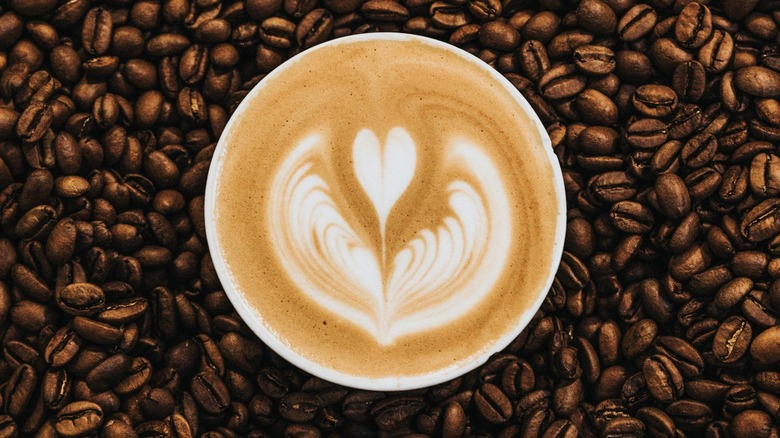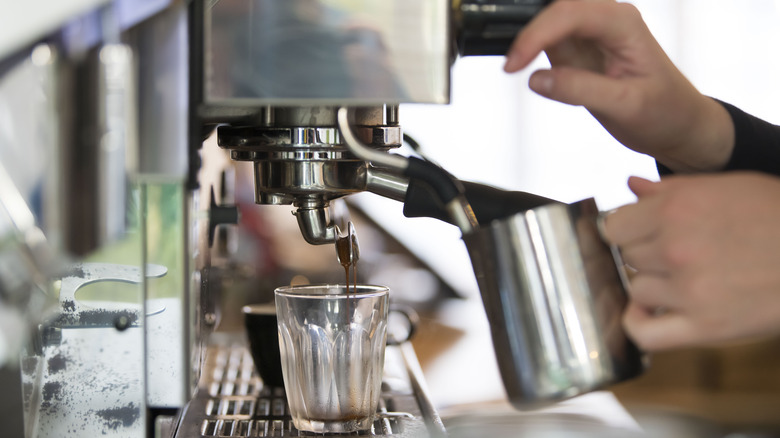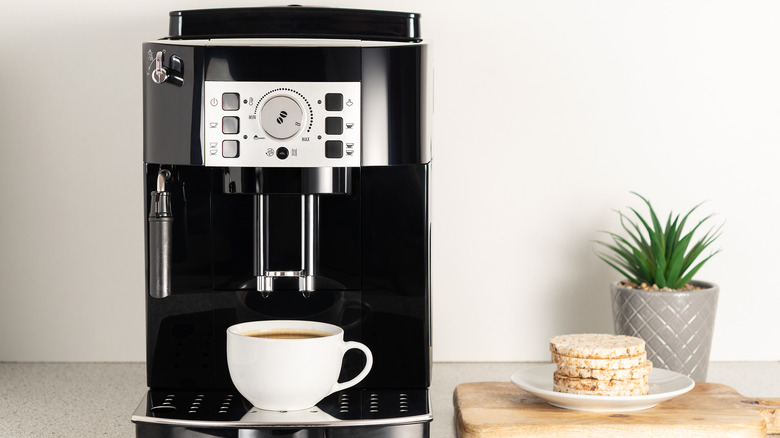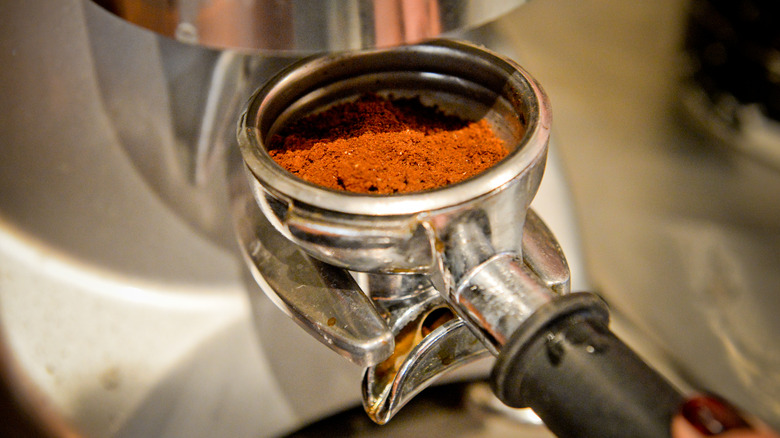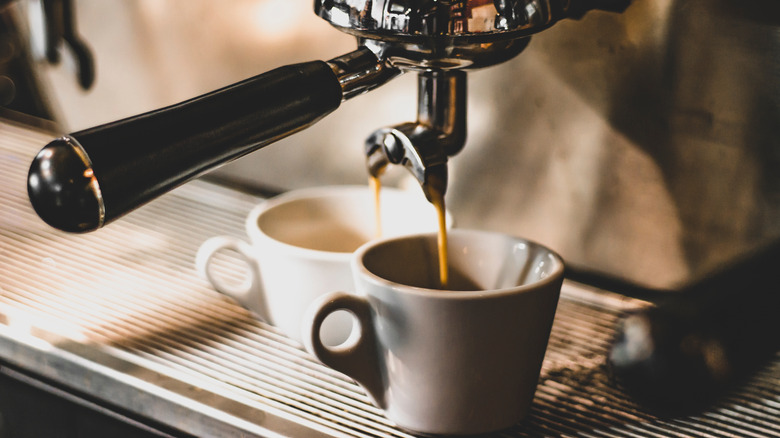What Makes Smart Coffee Makers Different From Regular Coffee Makers?
Let's be honest, not all of us need a smart refrigerator to tell us how many eggs are left in our pantry. But even if you're not the biggest fan of coffee, you're going to have to admit that having a smart coffee machine is pretty cool.
Comunicaffe predicted in 2017 that the market for smart coffee machines will grow from $64.65 million to $333.20 million in 2021. And with features such as a built-in grinder, frother, and energy-saving mechanisms, it makes sense why these smart machines are on the rise (via Digital Trends). You can also connect your Bluetooth to your coffee maker, so you can even order your Google Assistant or Alexa to make you coffee via the machine, without even being in the kitchen.
This differs from a regular coffee maker, which doesn't usually have all of these fancy features. Keep reading as we explore the differences between new and traditional — and which of the two actually yields better coffee.
How do the two differ?
There are obviously subgroups of coffee makers, but the one that usually comes to mind is the classic, manual coffee maker. You buy a bag of coffee beans from the store, grind them, throw them into a coffee filter, and add hot water, which would be done in the machine. This sounds simple enough, but there's a reason why it takes experience and practice to perfect a single cup of joe. You need to buy the right beans, time the brew properly, and even pair it with the right types of food (via Eater).
As touched on before, smart coffee makers make the process of making coffee a lot easier. And we're not talking about your Keurig machine here — the expensive machines in question allow you to do a lot more than decide if you want a 16-ounce or 24-ounce cup of coffee. So what are the benefits of a smart coffee machine, and is it actually worth your money?
When is a smart coffee maker better?
Like all smart gadgets, smart coffee machines are meant to simplify your everyday morning routine by using high-level technology. According to Ideaing, you can schedule times for your machine to brew you a hot cup of coffee straight from your smartphone. Additionally, another advantage of a smart coffee maker is that because they are more modern, many are equipped with frothers and brew strength settings, which many manual coffee machines don't include.
Furthermore, depending on your particular model, some smart coffee makers can make multiple cups of coffee at once, which can lead to a much shorter queue in the kitchen in the morning (via Family Handyman). This makes a smart coffee maker great if you have a large household, and if everyone in your family likes their coffee made in a particular way. If you have a particularly packed schedule, or if you're very specific about how you like your coffee, it might be worth it to invest in a smart coffee maker.
When is a regular coffee maker better?
Forget about your Nespresso or Keurig at the moment because we're not considering them as "regular" coffee makers here. When we say "regular coffee maker," we're talking about the ones that you don't need to plug into an outlet to use. These can range from French press to the Moka pot, which are both regarded for creating strong, flavorful coffee.
Though this depends on the version you have, you'll typically have to manually grind your own coffee beans, which many coffee aficionados know to be a very tedious process. Nonetheless, perhaps it is the long process that makes the taste of the finished coffee even better.
Lots of people rave about the AeroPress, which was invented by Alan Adler in 2005, according to Home Grounds. Kitchn rates the flavor of an AeroPress coffee a 10/10, and states it is extremely fast and easy to use, only taking 10 seconds to produce a cup. If you have a little bit of extra time on your hands and don't mind buying extra supplies, like coffee filters, then maybe a manual coffee machine is for you.
Will there be a difference in flavor?
Digital Trends actually asserts that the coffee from a smart coffee maker is looser and weaker in taste than one from a manual coffee maker. Likewise, in an article titled, "Why Smart Coffee Makers Are a Dumb but Beautiful Dream," a CNET writer details how the convenience that a smart coffee maker offers does not cancel out the weak and watery flavor of the coffee it makes.
We often get the idea in our heads that new is always better. However, a lot of the coffee machines that you see at cafés are traditional espresso coffee machines. Although they technically need power in order to run, espresso coffee machines must be told how much water to use, unlike modern, smart coffee machines (via How to Start a Coffee Shop). If you truly want to replicate the strong cup of espresso that you buy at your favorite coffee shop, you really should be investing in one of these.
Is there a notable difference in price?
A manual coffee maker can go for as low as under $20 at Walmart. But cheap doesn't always equal low-quality. Many cheap French press machines rank high on The New York Time's Wirecutter.
On the flip side, a smart coffee maker can go for as high as $6,000, according to Ideaing. And you may argue that this price comes with all the fun features of the machine. While smart coffee makers will often allow you to add any special flavors and adjust the strength of a coffee, there is a reason that die-hard coffee addicts stand by the traditional methods of brewing. It's simply more rewarding using processes approved by our grandparents.
Ultimately, it's your choice if you want to pay the extra money for a smart coffee maker. But with the years of tradition behind this popular drink and the process in making it, why not just stick to your Moka pot and use that money to buy some high-quality coffee beans.
